Fruits are highly nutritious and delicious, and one common advice everyone would give you is to eat lots of fruits during pregnancy. Nature pours all its sweetness and nourishment into them. Yet, there are fruits not to eat during pregnancy. Even though fruits carry nature’s goodness, pregnancy is not the right time to eat many of them.
Factors Not To Ignore While Consuming Fruits During Pregnancy
Fruits hold many essential nutrients, vitamins, and minerals that are highly beneficial during pregnancy. Therefore it is important to include certain fruits in your pregnancy diet.
Yet, there are some factors to consider before consuming fruits during pregnancy. First and foremost, always wash the fruits thoroughly under running water before eating. That is important to get rid of soils, dirt, pesticides, parasites, and other residues in the fruit’s skin. You can even use a vegetable brush to scrub away the dirt from the fruit surface.
Pregnant women who are diabetic should stay away from fruits with high sugar. Also, remove the bruised or damaged areas, no matter how small it is. This is because bacteria thrive in these spots.
Scroll down to find some fruits not to eat during pregnancy. Many of these fruits are highly nutritious and have some factors that contribute to a healthy pregnancy. Yet, if include in the pregnancy diet, the health risk associated with it outweigh the benefits. Hence it is better to totally avoid these fruits during pregnancy.
Related Reading: 12 Elements of A Healthy Pregnancy Daily Routine
15 Fruits Not To Eat During Pregnancy
Pregnancy is a challenging time. Sometimes you have to abstain from certain fruits because some of its properties or components are unsafe during pregnancy. Or else it is because that variety of fruit has the highest concentration of pesticides in it. Occasionally, the health conditions of expecting mothers make some fruits not suitable for her.
The good news is that even though you should stay away from certain fruits until delivery, you can still enjoy a wide range of fruits during pregnancy. In fact, there are fruits highly beneficial while consuming during pregnancy.
Calculate Due Date With LMP
1. Papaya- tops the list of ‘banned’ fruits during pregnancy
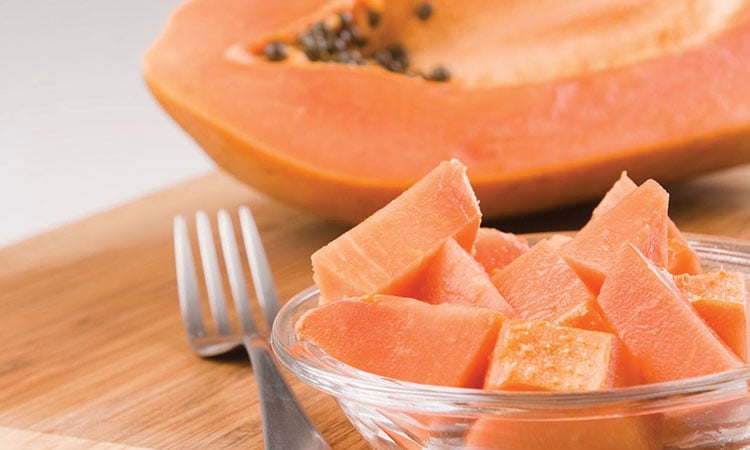
Papaya is rich in vitamins and minerals, and many of those nutrients are highly beneficial during pregnancy. Yet, this fruit is not safe for pregnant women. There are many reasons for this. Papaya can spike your body temperature. This is not good during pregnancy.
Besides, raw or semi-ripe papaya is rich in latex and papain. Papain in the unripe or semi-ripe papaya can trigger uterine contractions, bleeding, and even miscarriage. That is why raw and semi-ripe papayas are forbidden during pregnancy. The latex and papain in papaya may also impair the development of the fetus.
Although limited consumption of ripe papaya poses less risk, it is better to avoid eating both ripe and unripe papayas during pregnancy. You can rely on other safe fruits to get the same nutrients in ripe papaya.
2. Watermelon
Watermelon is a water-rich fruit, and normally it is very good for us as it helps to stay hydrated, especially in scorching summers. However, it is not wise to eat watermelon during pregnancy, owing to two reasons.
One of the main properties of watermelon is to flush out all the toxins from the body due to its diuretic effect. This might expose the baby in the womb to various toxins wash out by the fruit. Also, during this washout process, many essential nutrients might get flushed out as well. Both are not desirable.
Secondly, watermelon is fairly rich in carbs and low in fiber. Therefore, if crossed the limited eating, watermelon can cause blood sugar levels to spike, especially if the expecting mother has gestational diabetes.
Besides, according to Chinese traditional belief, watermelon is considered a cold inducing food. As this fruit slows down the blood circulation, the fetus may not be able to absorb enough nutrients. Therefore it is suggested to avoid it during pregnancy.
3. Frozen berries- avoid during pregnancy
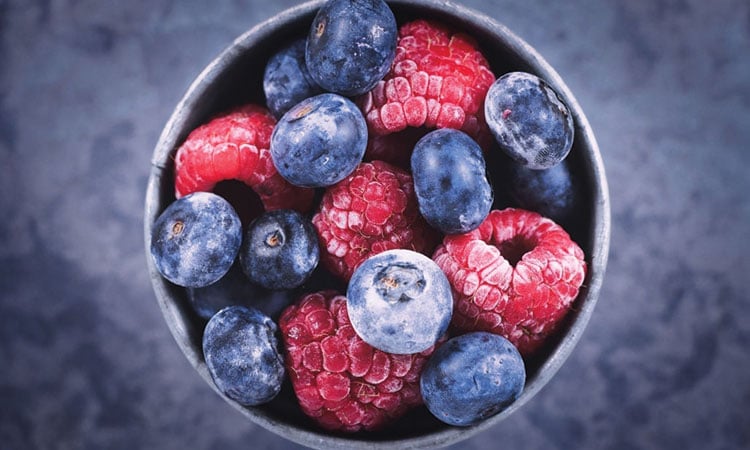
Berries are highly beneficial during pregnancy. It is actually recommended to eat lots of berries while trying to get pregnant. This is because it is loaded with phytonutrients and other vitamins and minerals that not only help you to conceive fast but also help you to carry out a healthy pregnancy.
However, it is always recommended to rely on seasonal fresh fruits and vegetables rather than those that have been freeze-dried or frozen or evened canned over extended periods of time when it comes to pregnancy.
Frozen and canned berries not only lose their original taste and flavor it can also carry toxins that can potentially harm the developing fetus.
4. Tamarind
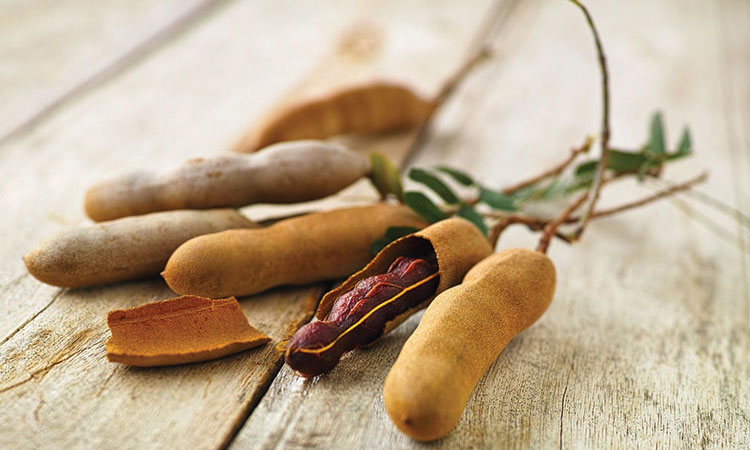
Tamarind is an excellent source of vitamin C, and it helps to boost immunity. Also, most pregnant women crave something tangy as tamarind. For some expecting mothers, tamarind might work as an antidote to nausea and morning sickness that bother them during the first trimester.
However, it is better to avoid or limit its consumption during pregnancy. As already mentioned, this fruit is extremely rich in Vitamin C. Excess vitamin C intake can result in the suppression of progesterone production.
A fall in progesterone level during pregnancy increases the risk of miscarriage and preterm labor. It can also result in fetal cell damage. Therefore it is better not to eat tamarind during pregnancy, especially during the first trimester.
Related Reading: 12 Early Pregnancy Tips To Avoid Miscarriage
5. Bananas
Bananas are highly nutritious and contain essential nutrients and minerals to carry out a healthy pregnancy. Then why this fruit in this list? That is because, irrespective of its benefits, eating a banana during pregnancy is not safe in certain instances.
Bananas can potentially spike the blood sugar level. Therefore expecting mothers with gestational diabetes should stay away from this fruit. Likewise, bananas contain a latex-like substance called chitinase. This can be allergic to some people. So pregnant women who have chitinase allergy should not eat bananas.
6. Pineapple

When it comes to fruits to avoid during the first trimester of pregnancy, pineapple ranks top. Pineapple contain an enzyme called Bromelain. This enzyme can trigger sharp uterine contractions and change the cervix’s texture- by softening it.
All these can lead to miscarriage or preterm labor. Besides, eating pineapple can bring about complications like diarrhea, which can result in dehydration.
7. Canned tomatoes
Tomatoes are beneficial during pregnancy if you eat in moderation. It is loaded with antioxidants and vitamin C and A. However, when it comes to pregnancy food, always opt for fresh vegetables, fruits, and freshly cooked meals.
It is always better to avoid canned food during pregnancy. The same is applicable to canned tomatoes. Canned tomatoes will be high in preservatives. This can potentially harm the healthy development of pregnancy and fetal health.
8. Dates

Dates are loaded with vitamins and essential nutrients. Eating dates in a limited way may not cause harm during pregnancy. On the other hand, being a rich source of iron, eating diet helps to prevent iron deficiency. Iron deficiency is one of the common issues faced by many mothers as the pregnancy progresses.
However, it is better to avoid eating dates during the first trimester of the pregnancy. This is because dates are heat inducing food, and if cross the limits (more than two dates per day), dates can trigger miscarriage during early pregnancy. Likewise, if cross the moderation mark, eating dates can trigger uterine contractions.
9. Grapes
Grapes have a high level of Vitamin A and Vitamin C. However, there are a few reasons not to eat grapes during pregnancy. First of all, the grapes’ heat-generating property is not at all good as it could trigger preterm labor or miscarriage.
Secondly, resveratrol, a compound present in the grapes’ outer skin, could be toxic to pregnant women. It can even trigger hormonal imbalance, which can adversely affect the pregnancy.
Another risk is the possibility of the presence of pesticides on its skin. It is one of those fruits that get sprayed with pesticides. It is hard to wash off these residues, and even if they entered the body in a negligible amount, these toxins could contribute to fetal health complications.
Related Reading: Can Lemon Water During Pregnancy Cause Abortion?
10. Peaches

Peaches are loaded with iron, potassium, and dietary fibre. It is also a great source of Vitamin C. Therefore, it should be beneficial during pregnancy. Yet, it is considered as one of the fruits not to eat during pregnancy.
This is mainly because of the concern of pesticide contamination. Another important reason to avoid eating peaches during pregnancy is peach is considered as heat-inducing fruit.
Therefore eating a lot of peaches during pregnancy can increase the body heat considerably, triggering a miscarriage. Also, the peel of peaches has hair-like projections, and if ingested, it can cause throat irritation.
11. Plums
Plums are highly nutritious, loaded with minerals and vitamins. Therefore, eating plums can be beneficial for pregnant women. However, if crossed the limits, eating plums during pregnancy can lead to certain side effects.
Plums are low in calories. Pregnancy is a time woman in need of extra calories. So eating plums will not satisfy your calorie needs. So rather than saying not to eat plums, it is better to say not to rely on plums. So eating one or two plums when you feel is okay during pregnancy.
Secondly, the overeating of plums aggravates the kidney stone issue. So if you are prone to kidney stones, keep away from plums during pregnancy.
12. Nectarine
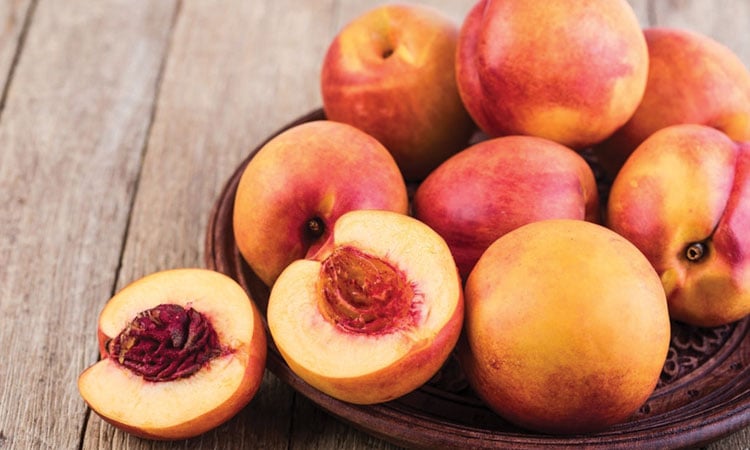
Nectarine is a fruit similar to peaches. It contains twice the amount of vitamin A, more vitamin C, and potassium than peaches. It is also a good source of iron and dietary fibre.
Apart from the numerous advantages of nectarine, pregnant women with diabetics should not eat this fruit as its sugar content is high. Likewise, you should not ignore the risk of pesticide contamination. Like peaches, Nectarines can also increase body heat, which is not good during pregnancy.
13. Guava
Guavas are an excellent source of minerals, folic acid, and are loaded with vitamins like vitamin E, A, B2, and C. However, if you cross the moderate consumption, guava can potentially trigger some side effects.
Excess consumption of guava can cause loose motion, which is very annoying during pregnancy. Likewise, eating guava without thoroughly washing increases the risk of listeriosis. Listeriosis can cause miscarriage.
14. Lychee
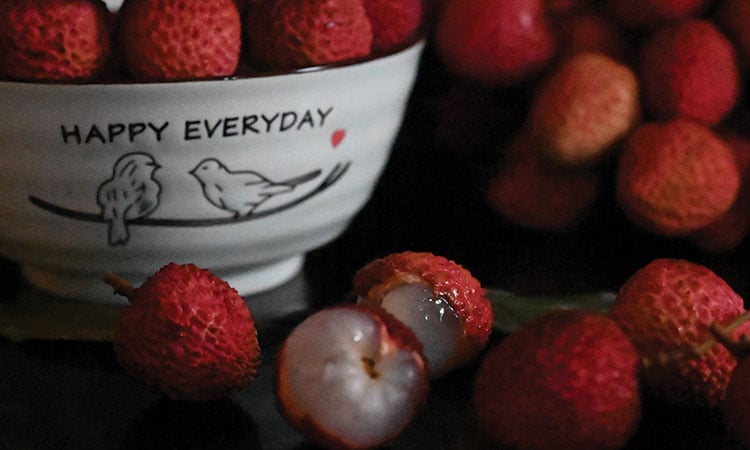
Lychee is an excellent source of vitamin C. Yet, it is one of those fruits not to eat during pregnancy. Eating lychee spikes the blood sugar level, thereby paving the way to gestational diabetes, which should be avoided during pregnancy.
Lychee can also increase body heat, which can trigger several complications, including bleeding during pregnancy. Lychee can also contribute to certain infections due to the toxins present in it. Though more often it is associated with unripe Lychee
15. Kiwi
Kiwis are highly nutritious. It is loaded with essential vitamins and minerals. It is also low in sugar and fats, it also has a considerable amount of dietary fibre. Yet, the latex of kiwi can cause an allergic reaction.
Suppose you have a history of developing allergy while eating kiwi, done eat kiwi during pregnancy. If you are allergic to avocados, figs, hazelnuts, etc., the risk of having a kiwi allergy also increases. Therefore, stay away from this fruit if you have any of those allergies.
Now you understand not all the fruits are safe to eat during pregnancy. Therefore avoid these fruits during pregnancy. You can always choose alternative fruits to satisfy your cravings and nutrition requirements. For some months, giving up your favorite fruit helps you reduce unwanted complication and carry out a healthy pregnancy.
Have a healthy pregnancy!

